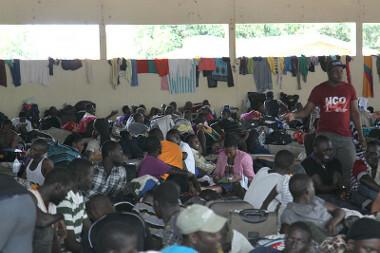History has always narrated different cycles of immigration to Brazil, whether during the colonization period or during later times. Over the centuries, various peoples occupied our country, most of them Europeans, but also Chinese, Japanese, Latin Americans, among others. However, we can say that Brazil is experiencing a new moment with regard to the issue of international immigration.
Over the past few years, there has been a growing movement of foreign groups in Brazil, coming from both developed and underdeveloped countries. According to data from Conare (National Committee for Refugees) and the Ministry of Justice, between 2010 and 2012 alone, the number of people seeking refuge in Brazil tripled.
The trend is that current immigrations in Brazil continue to increase, especially from populations from underdeveloped countries or with a precarious economic situation, in addition to people from regions marked by major conflicts, especially people from the Palestine.
In recent years, a large number of Haitians have come to Brazil, through the Amazon, in search of jobs and better living conditions. During the 2014 World Cup, the same process occurred, with immigrants from Ghana, who moved to Brazil due to the tournament, but did not return to their country of origin. Other countries that stood out in sending immigrants were Bangladesh, Senegal, Angola, among others.
In the same way that the number of foreigners in Brazil has been increasing, the number of Brazilians abroad has been decreasing. Between 2004 and 2012, the presence of Brazilians outside the country fell by half, from 4 million to 2 million, with the main housing destination being Portugal.
What can be seen is that the recent evolutions of Brazil in the economic scenario, in addition to the relative prosperity of emerging countries facing the financial crisis in the world have been contributing to developing countries - mainly those of the BRICS group - become attractive places for migratory routes international.
But the expansion of current immigration in Brazil is accompanied by a series of factors, namely:
The) increased xenophobia: Brazil, despite its internationally recognized receptivity, has been increasing cases of xenophobia, especially with populations from underdeveloped countries. For part of the population, foreign groups bring diseases, “steal” job vacancies and “threaten” the country's cultural identity. Interestingly, these arguments are similar to those imposed on Brazilians abroad, notably in Europe.
B) precarious living conditions: many foreigners in Brazil suffer from the precarious living conditions they find here, especially at the moment when who arrive when they still do not have a job, housing, food and money, in addition to even knowing the Portuguese language. This requires greater efforts by the authorities to meet the basic needs of these peoples, so that basic human rights conditions are met. There are many cases of work analogous to slavery practiced in the country, especially with Haitian migrants in the North region.

Haitian immigrants housed in a makeshift shelter in Acre in January 2014 *
ç) increased human trafficking: with Brazil becoming a new center of attraction for illegal immigrants, the number of human trafficking increases. Currently, the main efforts of the Brazilian government are to investigate and punish the practice of these groups, which in addition of charging high for “help” with illegal immigration, commit several crimes against human rights during the route.
Many people imagine that immigrants are harmful to the economy, particularly in terms of raising unemployment, but this is not entirely true. In many cases, there is the presence of immigrants with higher education in positions that are often idle here for lack of technical training, although the number of people with higher education in Brazil has increased significantly in the last decade. Furthermore, even with the increase in immigrants, unemployment in Brazil has been falling in recent times.
Although it is necessary to establish greater control over the number of current immigrations in Brazil, in addition to greater commitment to combating human trafficking gangs, it is also necessary to meet the basic needs of those here arrive. An example is the case of migrants from Haiti: they could not stay in Brazil according to our immigration laws, but many received humanitarian visas, given that a massive and immediate deportation could turn into a terrible crime Humans.
__________________________
* Image credits: Luciano Pontes (EBC) / Wikimedia Commons
By Rodolfo Alves Pena
Master in Geography
Source: Brazil School - https://brasilescola.uol.com.br/geografia/imigracoes-atuais-no-brasil.htm
